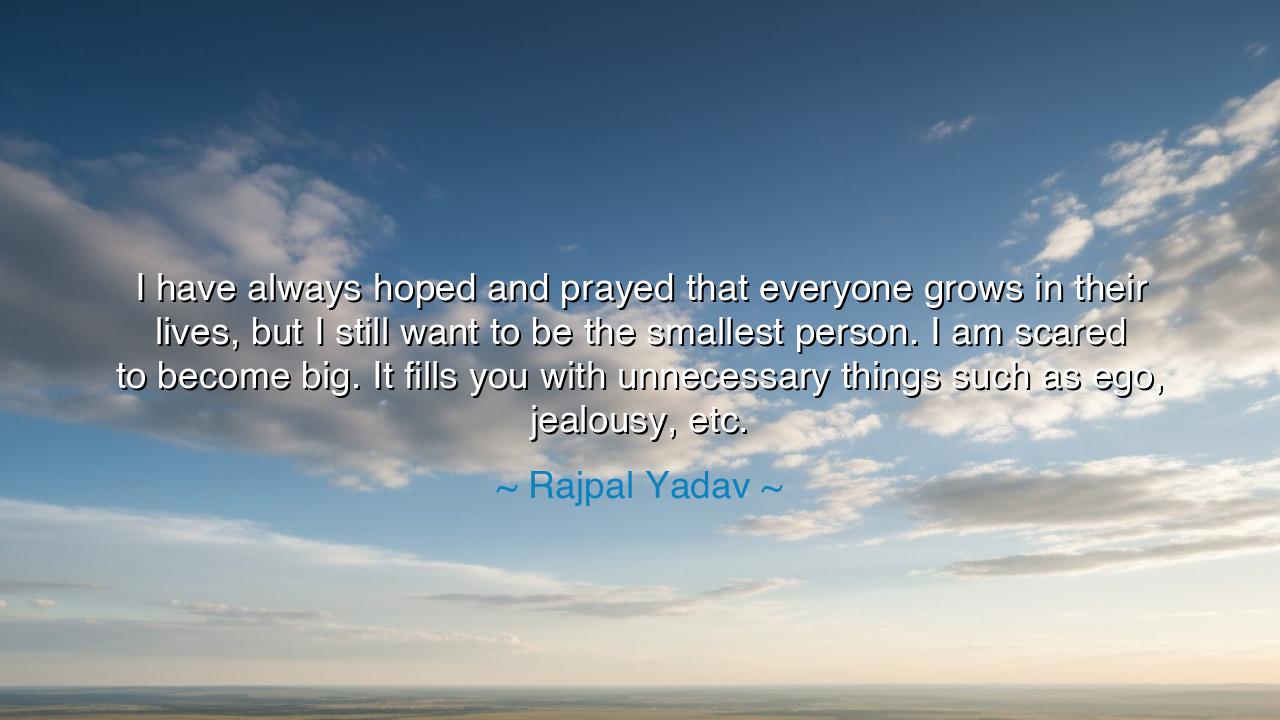
I have always hoped and prayed that everyone grows in their
I have always hoped and prayed that everyone grows in their lives, but I still want to be the smallest person. I am scared to become big. It fills you with unnecessary things such as ego, jealousy, etc.






“I have always hoped and prayed that everyone grows in their lives, but I still want to be the smallest person. I am scared to become big. It fills you with unnecessary things such as ego, jealousy, etc.” Thus spoke Rajpal Yadav, the humble actor whose life has been marked not by the hunger for fame, but by the wisdom of simplicity. His words shine with the paradox of true greatness: that the soul which desires to remain small in spirit often towers above the proud, while those who chase bigness are often diminished by their own vanity.
The meaning of his saying is clear yet profound. To be “big” in the eyes of the world—wealthy, famous, exalted—often brings with it burdens hidden beneath the glitter. With honor comes pride, with success comes envy, with recognition comes rivalry. Yadav warns that such bigness, though praised by men, may fill the soul with ego and jealousy, those silent poisons that corrode love, peace, and humility. To remain “small” is not to shrink from responsibility, but to live lightly, to keep one’s heart unburdened by arrogance, to value others’ growth above one’s own throne.
The ancients revered this truth. Lao Tzu, the sage of the Tao, declared that the greatest rivers flow to the lowest places, because they seek humility, not height. Christ himself taught that “the greatest among you shall be your servant.” And in India’s own tradition, the noble king Ashoka, after years of conquest, discovered that true greatness lay not in ruling through might, but in ruling through humility, service, and compassion. Each of these voices joins Yadav’s, proclaiming that the path to wisdom is not through exaltation, but through remaining small of heart.
History too offers its examples. Consider Mahatma Gandhi, who wore the clothes of the simplest villager though he was hailed as the father of a nation. He chose to remain “small,” walking barefoot among the poor, and in that smallness he became greater than kings. Contrast him with emperors and rulers whose “bigness” brought empires of gold, but left their souls shackled by pride and jealousy, remembered more for their downfall than their splendor. Thus Yadav’s fear is justified: for what many call greatness may, in truth, be a trap.
Yet his words are not a call to reject growth. He prays that all should grow in their lives—in wisdom, in joy, in opportunity. What he resists is not growth, but corruption. He urges us to seek inner growth, not outer inflation; depth, not height. To be “small” is to remain grounded, to remember one’s roots, to see oneself as no greater than others. It is to rejoice in others’ success without envy, to walk through life without being swollen by pride. In this, Yadav reveals that humility is not weakness, but strength—the kind of strength that is incorruptible.
The lesson for us, then, is this: guard your soul against the trappings of “bigness.” If recognition comes, wear it lightly. If success is given, use it as service, not as a pedestal. Cultivate humility as the highest treasure, for in humility lies peace, while in pride lies unrest. Let others grow tall, and rejoice in their flourishing, but remain steadfast in the spirit of smallness, so that envy, ego, and jealousy may find no soil within you.
So remember Yadav’s wisdom: “I want to be the smallest person.” For the smallest person is often the freest; the one who kneels low is often the one who lifts others highest. Be humble, and you will not be consumed by ego. Be content in smallness, and you will never be destroyed by jealousy. And in the end, when the proud have fallen, it is the humble who will endure, carrying within them the quiet greatness that outlasts crowns and thrones.






AAdministratorAdministrator
Welcome, honored guests. Please leave a comment, we will respond soon